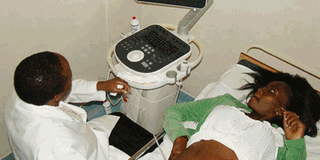Covid-19 reversing maternal gains

A sonographer conducts an ultrasound examination on a patient. Focus on Covid-19 may reverse gains in maternal healthcare. PHOTO | POOL | NATION MEDIA GROUP
With projected increase of Covid-19 infections in Kenya and execution of stricter measures to lower number of patients, delivery of maternal, neonatal and child health is bound to suffer.
The Ministry of Health estimated that 10,000 Kenyans would be infected with the virus by end of April. National and county governments are setting up structures in readiness for the surge in numbers including hiring of 5,000 more health workers.
This focus to contain the infection rate will, however, negatively affect delivery of crucial mother and child healthcare services including delivery, immunisation and family planning, experts argue.
HEALTH SERVICES
Dr Estelle Sidze, lead researcher on Maternal, Neonatal and Child Health at African Population and Health Research Centre (APHRC) outlines potential scenarios of how responses to Covid-19 would affect maternal and child health services.
“Crowding out of services with rising cases, diversion of health personnel, re-prioritisation of resources meant for maternal and child health services and lack of proper guidelines to continue ‘safe’ delivery of services at health facilities and communities,” she states.
She emphasises that increase in coverage of skilled deliveries, immunisation and family planning are key to lowering maternal and neonatal mortality rates.
United Nations Population Fund (UNFPA) has warned of disruption in supply of contraceptives, which would negatively affect women and girls.
“Closing of borders and constraints in manufacturers’ delivery flows are negatively affecting the import and in-country availability and distribution of contraceptives, essential maternal health medicines and other essential medicines including antiretroviral (ARV) drugs,” notes UNFPA in its March 23, brief on response to Covid-19 epidemic.
The current maternal mortality ratio is 362 per 100,000 compared to the 2008 ratio of 488 per 100,000 live births, according 2014 Kenya Demographic and Health Survey (KDHS).
While Contraceptive Prevalence Rate (CPR) stood at 58 per cent in 2014, a rise from 46 per cent in 2008.
EBOLA EPIDEMIC
There has been a progress in reduction of infant and child mortality rates.
As at 2014, under five mortality stood at 52 deaths per 1,000 live births compared to 115 deaths in 2003.
The successes are likely to be reversed if proper interventions on maternal and child care are unavailable during this period.
Ebola epidemic in Sierra Leone between 2013 and 2016 had a huge impact on maternal and neonatal health.
Decrease in antenatal care and use of family planning resulted to 3,600 additional maternal, neonatal and stillbirth deaths in the year 2014-15, the researchers indicate in their paper published in National Library of Medicine National Institutes of Health.
“To avert maternal and child deaths, women need to have access to appropriate and quality care before and during pregnancy,” Dr Estelle says.
That care for the mother should further extend to delivery, postnatal period and care of the child,she adds.
Covid-19 also presents an additional risk of other infections for pregnant women thereby endangering their lives and those of the unborn children.
Dr Estelle says: “Although the evidence is still not clear, if pregnant women have a greater chance of getting sick from Covid-19 than the general public, it is a fact that changes in pregnancy increase risk of some infections.”
While the government effects stringent measures such as curfew and restricted movements, it should ensure continuity in adequate, efficient and safe access to mother and child care services, she argues.
SENSITISE MEN
“(They should) put in place guidelines and ‘safety’ measures for continuous provision of maternal and child health information for disease prevention and care seeking at households by social mobilisers and community health workers or volunteers,” she notes.
She warns: “Failure in implementing such measures will result in higher percentages of foregone care for maternal and child health services, and higher levels of complications and deaths.”
Head of Population Dynamics and Reproductive Health and Rights Unit at APHRC Dr Caroline Kabiru, says the Covid-19 period provides a convenient time for sensitising men on their role in the use of family planning services.
“Often times, we say men are not involved in decisions around sexual and reproductive health but many times it is because they view it as a woman issue,” she explains.
“This is a good time to reach out to them with messages on contraceptive use and you will have an attentive audience,” she adds, noting that studies have shown men to be supportive of use of family planning services only that they lack the information.




